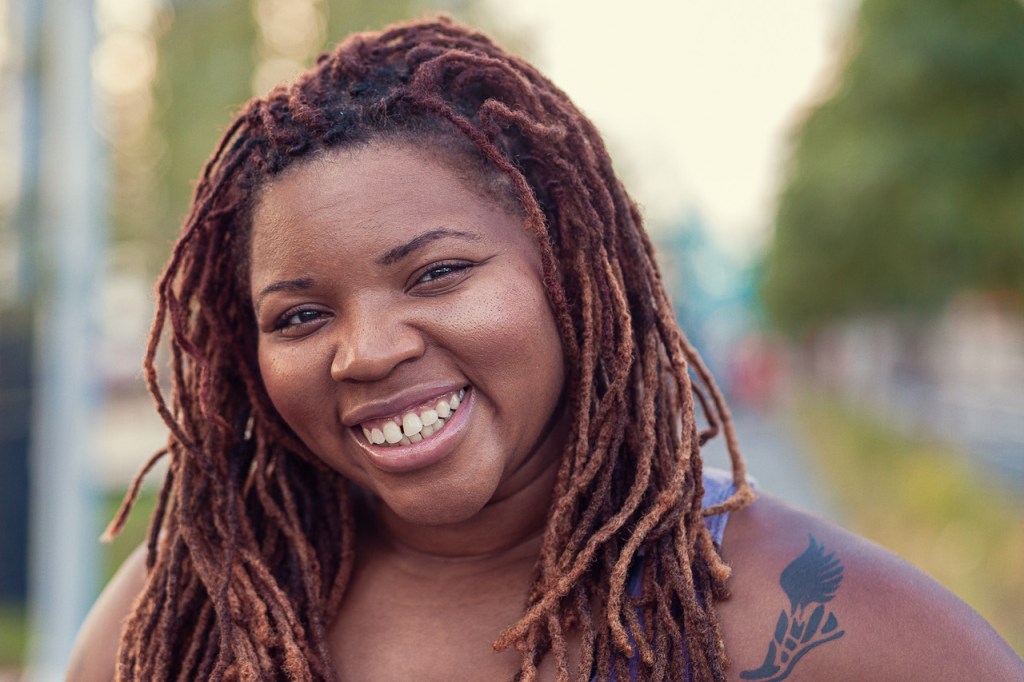Editor’s note on June 29, 2021: Since this article first published, a lot has changed. Amid the COVID-19 pandemic, Latoya Shauntay Snell launched a series of classes that support personal development. Her classes cover topics like acknowledging your inner athlete, silencing your inner troll and how to shut down the naysayers in your life. Learn more.
Early in the pre-dawn hours of Oct. 28, 2018, Latoya Shauntay Snell was shuffling through the arid Arizona desert. She was on the third and final loop of the Javelina Jundred, her first 100K trail race. In the weak circle of her cellphone light, she could vaguely make out the eerie shadows of saguaro giants looming in the dark.
Her headlamp was dead. Her feet were blistered and swollen. And Snell, exhausted, was doubting whether or not she could finish before the 29-hour cutoff. That’s when she saw it: a butterfly. It landed on her and lingered. It reminded her of her late father and the moments they shared watching butterflies outside their Brooklyn, New York, home. Snell started to cry.
“Every time I see butterflies on the course, it’s like my good luck charm,” she said. “I was crying so much I couldn’t cry anymore. Even though I was in so much pain, I took it as a sign.”
Snell finished within the time cutoff, and even though she wound up dead last, she said running has never been about the results for her. It’s about showing up. “Even if you don’t make it to the finish line, it’s an accomplishment that you’re even showing up to try,” she said. “That’s a celebration in itself.”
This has not been an easy lesson for Snell, a blogger and chef, to learn. At 5 foot 3 inches tall and 242 pounds, the 34-year-old runner has long struggled to love herself and her body. Snell grew up in Brooklyn during the height of the crack epidemic in a neighborhood she said was plagued with violence and crime. Her family struggled to make ends meet. Snell’s father battled drug addiction throughout her childhood, an experience, Snell said, that changed the way she thought about adversity.
“The one thing he left me with was just because something bad happens to you doesn’t mean you have to become it,” she said. “The last thing I ever thought I would have been was a runner. I didn’t even learn how to ride a bike until I was 28 years old. But a lot of the things that hold me back come from my own mind, not from what other people say.”
After dropping out of high school, Snell worked hard to build a career, first in social work and later in the culinary industry. She got married, had a son and thrived in the fast-paced world of New York restaurants. But in 2013, doctors diagnosed Snell with disc generation and sciatica. She was 255 pounds, in chronic pain and desperate for a change.
When a friend of hers signed up for a half marathon, Snell was intrigued. Running a half marathon had always been on her bucket list. So, she signed up for the Michelob Ultra Half Marathon in Queens. She finished the race in 2 hours and 55 minutes.
“That day was magical to me,” she said. “Through running, I realized I wasn’t giving myself enough credit. I am a force to be reckoned with.”

This month, Snell will be running her first 100-mile race. (Photo Credit: W. Eric Snell, Sr. )
In the six years since, Snell has toed the line at more than 185 races, ranging from 4-milers to 100Ks on both road and trail. To document her running journey, Snell started her blog Running Fat Chef. Snell said it was important for her to redefine the word “fat,” a label that caused her shame so many times.
“I used to think that if I was under a certain weight, then I was an athlete, and if I was over a certain weight, then I wasn’t an athlete,” she said. “Running is really the catalyst that changed my mindset. There’s not one type of runner out there.”
Snell’s blog posts are refreshingly human. She curses, she mourns, she cracks jokes. She shares actionable steps she’s taken to practice self love, like keeping sticky notes with lists of affirmations about her body on her mirror. Snell is forthcoming about the good, the bad and the real side of running—one of her first posts relays a story about the dreaded runner’s diarrhea.
In her races, Snell said she has been the victim of all too many hecklers. In 2017, while running the New York City Marathon, a man shouted at Snell from the sidelines, “It’s going to take your fat ass forever, huh?”
Snell could have stopped running after that. Part of her wanted to, she said. Three months prior to that incident, Snell had miscarried twins. Her doctors diagnosed Snell with endometriosis. But Snell responded the way she always has: She pushed through with pride. “The pounds are not what makes me,” she said. “It’s the person. It’s the spirit. It’s the tenacity.”
In late October, Snell will test that tenacity, back at the Javelina Jundred, this time attempting her first 100-miler. In preparation, Snell has been running between 45 and 60 miles a week, cross-training on a bike and working out at the gym. With ample hydration, anti-inflammatory meals and yoga, Snell said she’s learned how to better manage the pain from her endometriosis and sciatica.
“Running is for everybody. Celebrate the things you can do,” she said. “If yesterday you could run and do all these things freely, celebrate that, but if today you’re in pain and it’s all you can do to walk from one end of the hallway to the other, celebrate that, too.”
